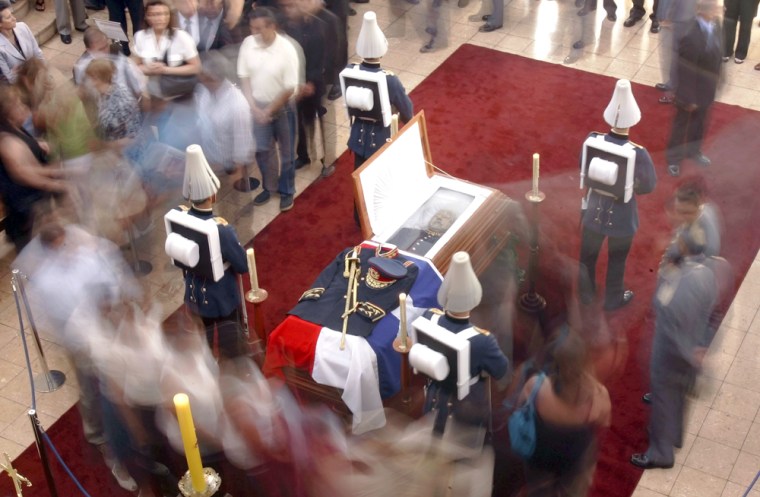Thousands of Chileans, some praying and many in tears, flocked to a chapel in Santiago on Monday to pay their respects to Augusto Pinochet, the former dictator who polarized the country and who died on Sunday.
Pinochet, who ruled Chile for 17 years, died in a hospital after suffering a heart attack a week ago. He had appeared to be recovering from the attack before his health suddenly deteriorated, doctors said.
News of his death prompted an outpouring of conflicting emotions in Chile where, a third of a century after he swept to power in a swift and violent coup, Pinochet’s legacy is still hotly disputed.
Some Chileans say the general saved their country from communism while others regard him as a murderer who escaped justice and should have been tried for human rights abuses.
Demonstrating Pinochet’s polarizing legacy, the government of President Michelle Bachelet, who was held in a notorious detention center, said there will be no official mourning and the former dictator will be given a military but not a full state funeral.
The Pinochet family criticized the government’s decision.
Bachelet will not attend the funeral but her defense minister Vivianne Blanlot will.
'Regards to the devil'
Several thousand people waited in line outside the military college where Pinochet’s body lay in state ahead of his funeral on Tuesday.
They entered the chapel, prayed, cried and filed past his glass-topped coffin, pausing to pay their respects to the general. Pinochet’s wife and at least two of his five children were in the chapel.
Pinochet’s body was clearly visible inside, dressed in a dark blue military uniform. His cap, sword and a braided military jacket were draped at the foot of the coffin.
“We’ve come in recognition of the great thing he did in saving us from the Marxist-Leninist cancer,” said Octavio Chau, a 32-year-old music producer waiting to pay his respects.
“It’s thanks to that that we’re a free country.”
Graffiti scrawled on the walls of buildings in central Santiago expressed different emotions. “Today, the murderer died,” read one message. Said another: “Pinochet, give my regards to the devil.”
Human rights abuses
In Spain, Isabel Allende, daughter of former President Salvador Allende who committed suicide during the 1973 coup, said she would have preferred to see Pinochet live long enough to face trial.
“At this moment my thoughts are with so many of our dead, certainly my father, but all our people who were disappeared, tortured, in the end murdered,” she said.
More than 3,000 people died in political violence during Pinochet’s rule. Some 28,000 people were tortured in secret detention centers and hundreds of thousands of Chileans went into exile, many never to return.
Pinochet was more recently accused of tax fraud and embezzlement related to $27 million stashed in foreign bank accounts.
But he was never brought to trial, as his defense lawyers argued he was too ill to face charges.
More than 5,000 people took to the streets on Sunday in response to the general’s death. Some popped champagne corks in celebration while others wept, waved red, white and blue Chilean flags and sang the national anthem.
Some demonstrations turned violent. Military police used tear gas to disperse anti-Pinochet protesters who tried to march to the presidential palace, which was bombed from the air during the 1973 coup which brought the general to power.
Chile’s newspapers were dominated by photographs of the dapper, mustachioed general. “Pinochet dies. Deep shock in Chile and the world,” was the headline in the biggest selling paper El Mercurio.
The front page of La Nacion newspaper was black, with a sinister photograph of Pinochet peering out from its center.
“Pinochet 1915-2006. Never again,” ran its headline.
